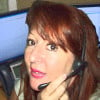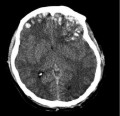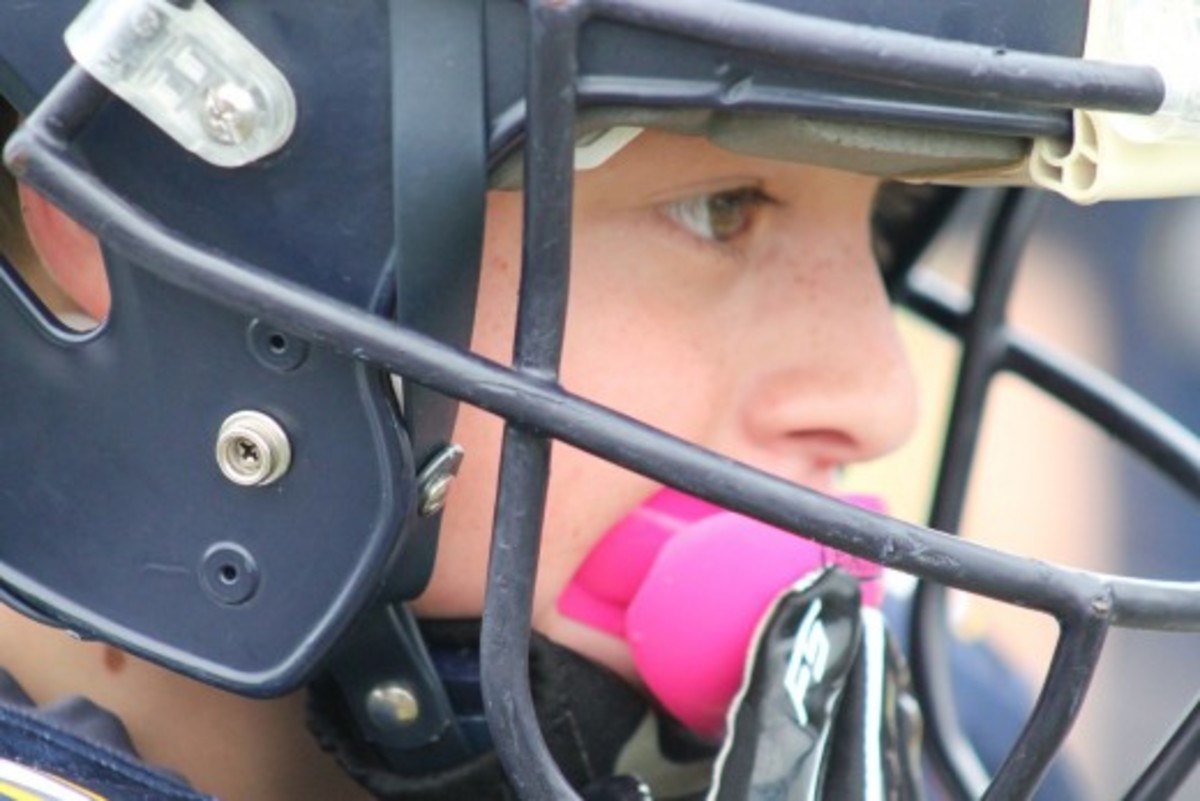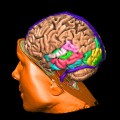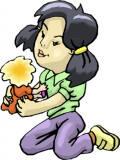What is Traumatic Brain Injury (TBI)?
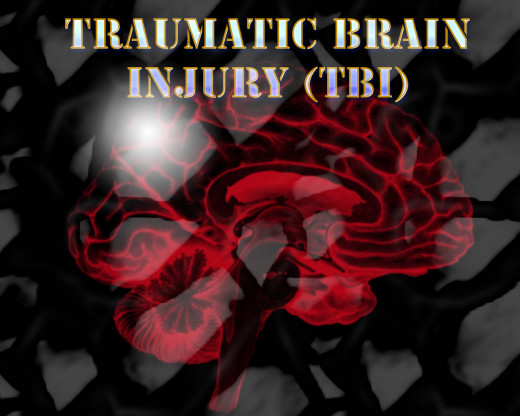
Traumatic Brain Injury
Traumatic Brain Injury or TBI is the result of brain damage related to an outside force applied to the head. The head may be injured from a blunt force from an object, or the brain may be damaged from head hitting a solid object, such as in an auto accident. Injuries to the brain may change an individual’s behavior, personality and physical abilities. People with brain injury may exhibit mental illness or experience memory loss depending on the area of the brain that is affected. If a brain injury is extensive enough to cause a change in mental functioning, the injury will show up on a brain scan.
What Brain Structures are Responsible for Personality?
As new theories evolve in personality theory, the newest discoveries have to do with the development of certain brain structures that make certain aspects of our personalities more prevalent. For instance, a very conscientious person may have a large frontal lobe, or a person that is outgoing and appears intellectual, may have a large portion of the brain above the eyes, known as the medial orbitofrontal cortex, which is the region responsible for social stimulation and assertion. In other words, the highly developed areas of the brain are what shape our personalities and the way we perceive the world around us. Damage to these unique brain structures may change our perception of the world and thus, our personalities.
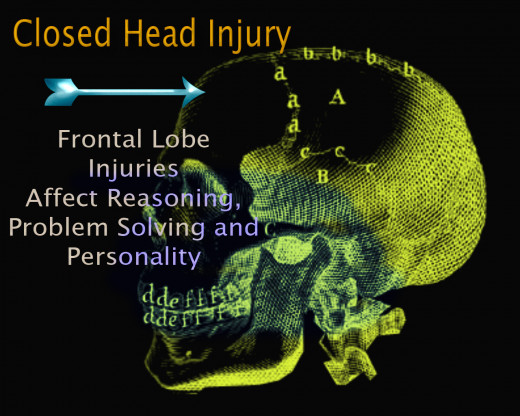
Frontal Lobe Damage and Personality Changes
Frontal lobe injury can result in severe depression, severe anxiety, substance abuse and obsessive compulsive disorder. After a brain injury, some survivors experience post-traumatic stress disorder (PTSD) as well. The frontal lobe, in most scientists opinion, is the part of our brain that is the most responsible region that shapes our personalities and the way we behave. Our higher functions, such as reasoning, problem solving, rationality and right and wrong, are attributed to the Frontal lobe.
Damage to the Brain and Physical Changes and Abilities
Traumatic brain damage may affect the way people walk, move or process information. Affected persons may lose the ability to speak, hear or visualize. The different lobes of the brain are responsible for controlling specific abilities, and brain damage may "disconnect" the ability of the lobes of the brain to work together. Although amnesia is common in the movies and soap operas, total amnesia lasting for years is quite rare, and if does occur, doesn't last an extended period of time.
The Head is Struck and the Brain Bounces Back and Forth Inside the Skull and Damage to Both Sides of the Brain Occurs
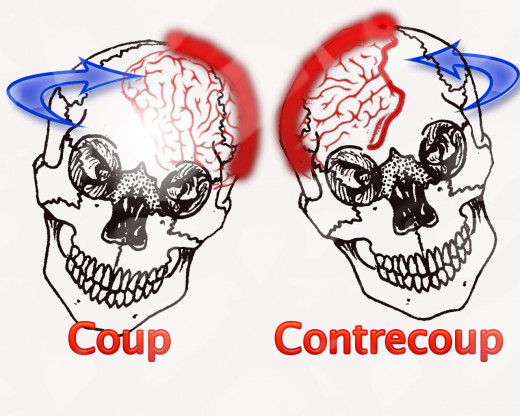
Common Brain Injury Occurrences
Brain injuries from consecutive concussions overtime may cause severe physical limitations as well as mental impairments. Professional athletes have been noted to experience severe depression and exhibit a high rate of suicide. Scientists are proclaiming with a strong voice that these changes in behavior, increased substance abuse, depression and violent aggression are all the results of contact sports and the damage it causes the brain tissue. Chris Benoit, the famous wrestler who had murdered his son, wife and himself, had a forensic exam that resulted in a severely damaged brain from sports related injuries. Although this is an extreme case, it is becoming more common in sports figures and other athletes.
Closed Brain Injuries
When the head is struck on either the back or the side of the skull, the effects of Coup and Countrecoup cause the whiplash effect of the fluid filled brain to strike the skull from one side to the other. This damages both sides of the affected brain and may lead to a concussion. There is no signs or symptoms of the skull being broken or damaged on the outside.
Open Head Injuries
Injuries that penetrate the skull and affect the brain are considered "open head injuries." A sharp object or a massive force break the skull and cause damage to the brain tissues. Open head injuries are always treated in an emergency hospital setting and try to prevent infection and manage symptoms while the brain heals.
What is a Concussion?
The brain tissue is bruised from a blow to the head from a force that causes internal bleeding or "shock" that results in unconsciousness with the after affects including confusion or temporary loss of memory. If several concussions occur throughout a lifetime, significant brain damage may change a person's ability to function, or change their personality.
Lobes of the Brain
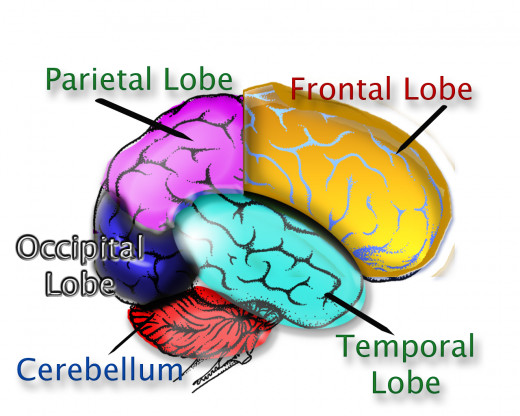
Parietal Lobe Injuries
The Parietal lobes on the left and right perform different functions and are in some ways independent of each other. The right Parietal lobe understands space and sequence, such as drawing or dressing one's self. Damage to the right side can cause severe deficits in performing self care activities. The left Parietal is concerned with memory and recalling sequences of ideas. For example, when you recall a phone number, it is your left side at work. Damage to the left Parietal may cause difficulty in speaking or recalling the "right words," reading and writing. Problems with distinguishing right from left, and dyslexia may occur. Damage to both sides may cause a profound deficit in controlling one's gaze, and objects and the faces of loved one's may not be recognized. People with this condition often have to hear the voice of the person to recognize who they are.
Temporal Lobe Functions and Injuries
The Temporal lobe is not only responsible for hearing, but for transferring the sounds to the parts of the brain. Auditory perception is a very complex system that requires many different brain functions to hear, recognize the sound and then remember the sound. This lobe also functions as a long term memory center that recalls words and sequential memories to make them recognizable to the brain. If damage occurs to the Temporal area, people will not recognize sounds or language. Although the ears may "hear" the sound, the person may not be able to categorize the words. Highly important to memory, a damaged lobe may even cause a person to loss the ability of speech. Temporal lobe damage may cause emotional changes in personality, such as aggression, paranoia and hyper sexuality.
Damage to the Occipital Lobe
The Occipital is responsible for vision and motor functions associated with visual perception. The ability to locate objects and track moving objects. Fortunately, this lobe is at the back of the head and is not typically injured, although construction workers on a work site have been struck in this area when told to "look out!" by falling objects. Damage to this lobe will cause visual changes to the perception of objects and people. The eyes may still be able to see, but the Occipital lobe cannot tell the rest of the brain "what the object is." Injury to this lobe can cause disturbing visual illusions and hallucinations. Often, people with Occipital lesions or tumors may be inadvertently diagnosed with Schizophrenia or other mental illnesses.
Injury to the Cerebellum
The Cerebellum is the center for balance, motor activity and coordination. Recently, scientists have discovered that injury to this region of the brain may result in mood disturbances and changes in cognition as well. Although damage to the cerebellum affects gait, movement and physical skills, it is now a subject of controversy concerning the higher functions of the brain. Once believed to be only a symptom from an impaired Frontal lobe, researchers have now coined Cerebellar Cognitive Affective Syndrome as the result of damage to the Cerebellum. Personality changes are now evident, and new studies are being conducted to research further findings.
Functions and Personality Changes from Damage to Lobes of the Brain
Injury to Brain Region or Lobe
| The Function of Brain Area
| Effects on Behavior or Personality
| Signs and Symptoms of Injury
|
|---|---|---|---|
Frontal Lobe
| Motivation, Social Skills, Planning, Problem Solving and Filters Behavior
| Antisocial Personality Disorder, Schizophrenia, Attention Deficit Disorder.
| Inappropriate aggression, Impulsive, Short Attention Span, Loss of Social Skills, Unable to Concentrate or Focus, Poor Memory, Low IQ
|
Parietal Lobe
| Perspective and to Understand Space, Touch, and Volume
| Anxiety Related to the Inability to Recognize Faces, Loss of Spacial and Visual Perception
| Poor Memory, Poor Judgement, Loss of Math and Reading Ability
|
Temporal Lobe
| Hearing, Long Term Memory and Emotional Responses
| Paranoia, Rage Aggression, Hyper Sexual or Sexual Obsession
| Inability to Hear, Speak and Poor Long Term Memory
|
Occipital Lobe
| The Center for Visual Perception
| Paranoia, Visual Hallucinations and Illusions, High Anxiety and Depression
| Blindness, Loss of Visual Field and Perception
|
Cerebellum
| Coordination, Balance, Walking, Working Memory, Movement and Higher Reasoning
| Affective Disorders, Rage and Anger, Impulsitivity
| Loss of Sequential Thought, Walking, Movement and Balance
|
Author/eHealer
Signs and Symptoms of a Concussion
Concussions usually express brain trauma with headache, confusion and memory loss. Head injuries may be very subtle and always consult a medical professional after any injury to the brain that causes loss of consciousness.
Signs and Symptoms of a Concussion:
- Headache or a feeling of pressure in the head
- Temporary loss of consciousness
- Confusion or Amnesia
- Doesn't remember the event
- Dizzy or visual disturbances
- Tinnitus or ringing in the ears
- Nausea or vomiting
- Speech is affected or slurred
- Complaint of fatigue
Head Injury in Children
It is difficult at times to tell if your child has had a concussion. Besides headache and tiredness, children cannot always explain their symptoms to adults. Some signs and symptoms in children are:
- Restless and listless
- Irritable and easily angered
- Loss of appetite
- Insomnia
- Loss of interest in play
- Disturbances in coordination, walking or balance
If you suspect your child has had a head injury, consult your pediatrician immediately and monitor the child for signs and symptoms of:
- Vomiting
- Increased headache pain
- Symptoms that worsen overtime
- Fever
- Difficulty with motor skills and balance
